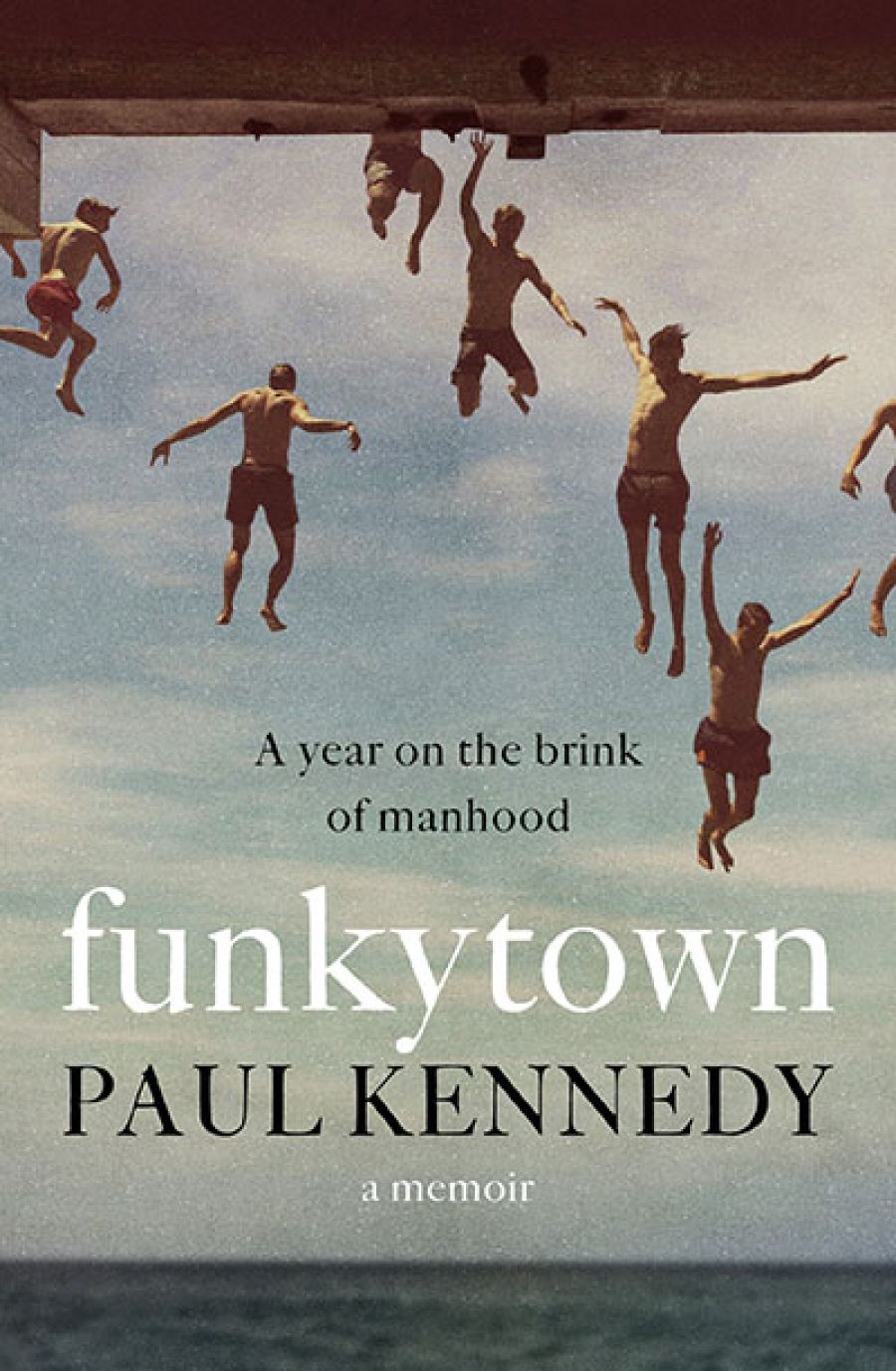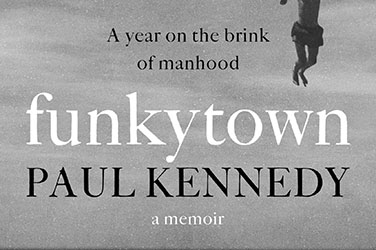
- Free Article: No
- Contents Category: Memoir
- Review Article: Yes
- Article Title: At the crossroads
- Article Subtitle: Paul Kennedy’s wayward youth
- Online Only: Yes
- Custom Highlight Text:
Seasoned ABC journalist and presenter Paul Kennedy, also known as ‘PK’, has over the years cultivated an affable, equable public persona. For regular viewers of the ABC’s News Breakfast program, Kennedy is the kind of person with whom one would like to have a drink; to pore over sporting results or the tumult of living through a pandemic. It is a shock, then, to discover that Kennedy was not always this picture of fatherly composure but once an insecure, frustrated, and troubled seventeen-year-old, trapped within the confusing void between boyhood and manhood.
- Featured Image (400px * 250px):

- Alt Tag (Featured Image): Nicholas Bugeja reviews ‘Funkytown’ by Paul Kennedy
- Book 1 Title: Funkytown
- Book 1 Biblio: Affirm Press, $32.99 pb, 305 pp
Kennedy’s foray into memoir is spirited and educative. Funkytown – which doubles as the affectionate sobriquet that Kennedy, his sister Kate, and school friends used for their home town of Frankston, in Melbourne’s south-east – maps out his formative and final year of school at Patterson River Secondary College. The beginning of 1993 is ripe with possibility: good grades could be Kennedy’s ticket to a university education; a consistent season of representative football could have him drafted by an AFL club; and he might just form his first genuine romantic connection. ‘This was my big year, and I knew it,’ Kennedy writes in his characteristically plain and punchy prose.
Instead, those aspirations, once within reach, are derailed by chronic ill-discipline, interminable binge drinking, and the pernicious forces of peer pressure. Kennedy encapsulates his failings thus: ‘I was undrafted, unwanted and going nowhere.’ The book is a disarmingly honest account of Kennedy’s wayward youth, during which the advice of respected and respectable role models was routinely cast aside in favour of fleeting – and in many cases, illusory – pleasures. After Kennedy absconded from a taxi without paying the driver, Kennedy’s blue-collar father, with characteristic sagacity, observed: ‘I see you going to the gym every day … Maybe it’s time you did something to improve your personality and attitude.’
Unlike the Greasers in S.E. Hinton’s influential début novel, The Outsiders (1967), whose tribulations could be partly attributed to a dearth of bona fide role models, Kennedy could make no such complaint. Blessed with loving parents who raised him in ‘a household of consistency and peace’, dedicated and attentive teachers, forthright and motivated football coaches, and industrious teammates like Ant Harvey (brother of St Kilda legend Robert), Kennedy constantly received support, guidance, and counsel. ‘Stop drinking and stop fucking smoking. Take your footy seriously,’ Harvey implored Kennedy at a Seaford Football Club function. Nonetheless, Kennedy would repeatedly succumb to his vices, adhering to the foolhardy codes of ‘the hard-drinking blokes of the local football club’ and escaping, however temporarily, from deeply rooted feelings of masculine insecurity and self-doubt, and the pressures of vicissitudes beyond his control. For Kennedy, binge drinking offered a ‘type of cleansing’, in which he could obliterate his ‘shameful shyness’.
At no juncture is Funkytown a one-dimensional, gloomy exercise in self-critique. It is, instead, a considered and at times contradictory portrait of a young life at the crossroads of self-destruction and success. There is cause for optimism and glimpses of the person Kennedy will become. His new-found engagement with literature – encompassing Thomas Hardy’s Tess of the d’Urbervilles (1891), Margaret Craven’s I Heard the Owl Call My Name (1967), and Pat Conroy’s The Prince of Tides (1986) – sparked a dormant curiosity for writing and the world beyond outer Melbourne. Craven’s novel ‘made its way into my marrow … I decided I wanted to become a Margaret Craven; to tell wise stories,’ writes Kennedy. This discovery, of books and ideas, no doubt set him on the path to a vocation of journalism and writing.
An irreverent, if sometimes adolescent, sense of humour also runs through Funkytown. Writing of his frail religious commitment, Kennedy facetiously remarks ‘Sundays were for footy anyway’. Football is frequently associated with the transcendental (‘Was that why I heard commentators call Australian football a religion?’). While playing, ‘life didn’t exist beyond the painted white lines of Moorabbin Oval’, a statement illustrating the all-consuming effect it had upon him. Later, Kennedy likens the change rooms in the Melbourne Cricket Ground’s Great Southern Stand to ‘Superman’s Fortress of Solitude’.
However, the callous murders of Elizabeth Stevens, Debbie Fream, and Natalie Russell within the Frankston area deprived Kennedy of his innocence and shattered his community’s sense of cohesion. ‘Round our way growing up, divorce was just about the scariest thing I’d heard about,’ he writes, recalling his sheltered childhood. Kennedy’s account of these awful events is executed with judicious restraint. Loath to indulge the voyeuristic tendencies of contemporary true crime books and documentaries, he refuses to delve into the details of the murders. Indeed, the news that Natalie, a schoolmate of Kennedy’s, had been murdered is much more powerfully communicated through the imagery of soon-to-be AFL ruckman Jeff White – struggling to process his grief before a football match – than through a description of her final moments.
Funkytown is at once the self-contained story of a pivotal year in Kennedy’s life, a cautionary tale of the dangers of a lack of self-control, and a reminder that the course of one’s life is not determined during the stages of youth. Kennedy is a living testament to that last assertion, given that he has forged a successful journalistic career, coached Seaford Football Club, and, most of all, proven a valued member of his community. Funkytown should serve as essential reading for teenage boys and their parents.


Comments powered by CComment